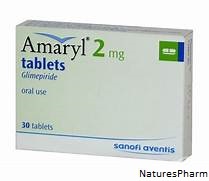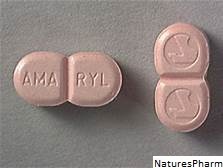What is Amaryl?
Amaryl is a prescription medicine used to treat diabetes in patients that need to keep their blood sugar levels under control. This medicine is a second-generation sulfonylurea derivative that stimulates the production of insulin in the pancreas, making diabetes management easy. However, just taking the drug may not be enough, so Amaryl patients are often recommended a certain lifestyle and dieting. Doing regular exercise is also a good idea, as all that promotes the patient's overall health and helps their body function properly. It's not a good idea to use Amaryl if you have a history of an allergic reaction to Glimepiride, as the same reactions is most likely to occur once again.
Your doctor will need to be notified of any medical conditions you have, especially if you have any at the moment (as opposed to a history of such a condition). You will need to mention any of the following ones when you are talking to your doctor: kidney disease, heart disease, being under-nourished, liver disease, glucose-6-phosphate dehydrogenase deficiency, allergies to sulfa drugs, adrenal or pituitary gland problems. If there are any other conditions you think may be worth mentioning, do not hesitate to do that as well. It's also a good idea to ask any questions you have at this point. You need to be absolutely clear about the way Amaryl works and what you can expect from the treatment.
For your treatment to be efficient, you will need to make sure you take every dose of Amaryl at the same time every day. If you are taking it once daily, take the dose with your first meal of the day, trying to avoid skipping that meal. Take every dose with a full glass of water and avoid using any alcohol from that purpose. Keep in mind that Amaryl is a treatment rather than a cure. That means, it will not cure your diabetes, rather than help you keep the symptoms under control. You will need to take it all the time to control your blood sugar levels efficiently.
Make sure you closely follow the routine prescribed by your health care provider to avoid low blood sugar levels. You will need to be able to recognize the symptoms of low blood sugar and eat something that contains sugar. The best sources of sugar include orange juice, hard candy and actually fructose tables. Try to avoid exercising too much, as well as drinking alcohol and skipping your meals, as those factors are likely to affect your blood sugar levels.
It's important to tell your doctor about any serious side effects of Amaryl you experience, although they are not very likely. Call your doctor if you notice such side effects as muscle pain, seizure, fever, trouble breathing, unusual weakness, dark urine, upper stomach pain, low fever, hallucinations, numbness, tingly feeling, yellowing of the skin or eyes, vomiting, easy bruising or bleeding, nausea, loss of appetite, clay-colored stools, or restlessness to get professional advice. At the same time, mild side effects like skin rash, mild itching, headache, diarrhea, mild nausea, stomach pain, dizziness, vomiting, tiredness, and increased skin sensitivity do not need to be reported unless they get worse with time. In most patients, they do not last for longer than a few hours. Other side effects are also possible, as the ones mentioned are just most commonly reported ones. It's up to your to decide which of the side effect you get but that have not been mentioned above are important to report and which ones do not seem too bothersome.
While some drugs can cause low blood sugar when combined with Amaryl, others can lead to high blood sugar. Both situations are undesirable and can be prevented as long as you know which drugs you are not supposed to use. In general, you will need to let your doctor about any drugs like antibiotics, MAO inhibitors, anticoagulants, niacin, oral contraceptives, prednisone, drugs for blood pressure or heart disease medications, phenytoin, or probenecid. Some of them can contribute to lower levels of blood sugar, while other ones have opposite effects. Such medications as exenatide, salicylates, sulfa drugs, probenecid, nonsteroidal anti-inflammatory drugs, antibiotics, other oral diabetes medications, blood thinners, fluoxetine, monoamine oxidase inhibitors, clarithromycin, and disopyramide are known for lowering your low blood sugar, while high blood sugar is possible if you combine your Amaryl with colds and allergies drugs, diet pills, thyroid medicine, isoniazid, asthma medications, phenothiazines, niacin, seizure medicines, diuretics, steroids, hormones, and some birth control pills. Talk to your doctor about the drugs you are using to make sure your treatment is safe and still as efficient.
A pregnant or breastfeeding woman will need to tell her doctor about the situation, as Amaryl is FDA pregnancy category C. That category means there is not enough information on the effects this drug may have on unborn babies. However, some studies into a group of drugs similar to Amaryl showed that those drugs can cause low blood sugar in newly born babies whose mothers were receiving treatment for their diabetes. Whether Amaryl can pass into breast milk and affect the health of a nursing infant is not known either.
You will need to avoid taking too much of Amaryl, as the following symptoms may occur: trouble speaking, fainting, blurred vision, nausea, seizure, sweating, extreme weakness, and confusion. Any cases of overdose will have to be reported and treated as soon as possible. Make sure you never take too much of Amaryl, as that can result in the success of your treatment being affected, as well as cause unpleasant symptoms you will need to deal with.
Before you start taking Amaryl
How to start your Amaryl treatment
Important information about Amaryl to consider
Which Amaryl side effects can I experience?
Can I take some other drugs with Amaryl?
Why pregnant women may not be able to use Amaryl
If an overdose of Amaryl takes place


